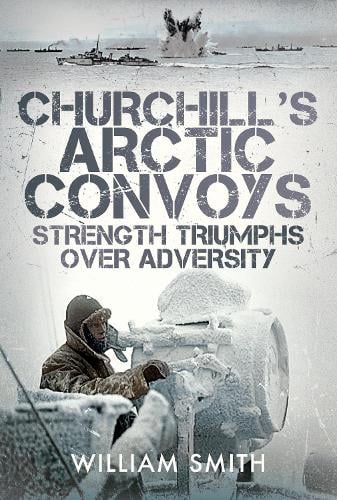Churchill's Arctic Convoys
Usually shipped within 24 hours
UK deliveries from £5.95
Delivery & Returns
Delivery & Returns
We use the Royal Mail, DHL Express or UPS for our customers. For UK addresses, deliveries under 10kg are a standard £4.95 via Royal Mail Tracked 48 Service. For orders over 10kg and overseas customers, postage is calculated for you at checkout once you have entered your postal address. This price, does not include any potential custom charges that may apply, depending on the product or destination, as every country has very different import duties / taxes. Online exclusive products (such as trainers) will be delivered to you directly from the printer, separate from other items in your order, but your postage fee covers ALL items in your order.
If you are unhappy with your purchase, please email shop@tankmuseum.org within fourteen (14) working days of receiving your goods, and return it to us at the address below, in its original condition, unopened (with any seals and shrink-wrap intact) and we will issue you a full refund or replace it. Goods must be returned at your own cost. If the item is faulty, you do not need to return it, we will send you a replacement free of charge.
Description
Description
By William Smith
Hardback
The threat of Operation Barbarossa, Hitler's surprise invasion of Russia in June 1941, succeeding prompted Churchill to decide to send vital military supplies to Britain's new ally.
The early sailings to Northern Russia via the Arctic Ocean between August 1941 and February 1942 were largely unopposed. But this changed dramatically during the course of 1942 when German naval and air operations inflicted heavy losses on both merchantmen and their escorts.
Problems were exacerbated by the need to divert Royal Navy warships to support the North African landing. Strained Anglo-Soviet relations coupled with mounting losses and atrocious weather and sea conditions led to the near termination of the programme in early 1943. Again, competing operational priorities, namely the invasion of Sicily and preparations for D-Day, affected the convoy schedules.
In the event, despite often crippling losses of lives, ships and supplies, the convoys continued until shortly before VE-Day. This thoroughly researched and comprehensive account examines both the political, maritime and logistic aspects of the Arctic convoy campaign. Controversially it reveals that the losses of merchant vessels were significantly greater than hitherto understood.
While Churchill may not have described the convoys as the worst journey in the world', for the brave men who undertook the mission often at the cost of their lives, it most definitely was.
![Churchill's Arctic Convoys Book [variant_option4]](http://tankmuseumshop.org/cdn/shop/files/9781399072298_e29194ff-a7f0-414b-a63b-a297c0cd277c.jpg?v=1743153723&width=1214)

![Churchill's Arctic Convoys Book [variant_option4]](http://tankmuseumshop.org/cdn/shop/files/9781399072298_e29194ff-a7f0-414b-a63b-a297c0cd277c.jpg?v=1743153723&width=88)
![Christmas Tank Museum Wrapping Paper - Two sheet pack Wrapping Paper [variant_option4]](http://tankmuseumshop.org/cdn/shop/files/DSC2318.jpg?v=1759225755&width=176)
![Churchill's Arctic Convoys Book [variant_option4]](http://tankmuseumshop.org/cdn/shop/files/9781399072298_e29194ff-a7f0-414b-a63b-a297c0cd277c.jpg?v=1743153723&width=640)



